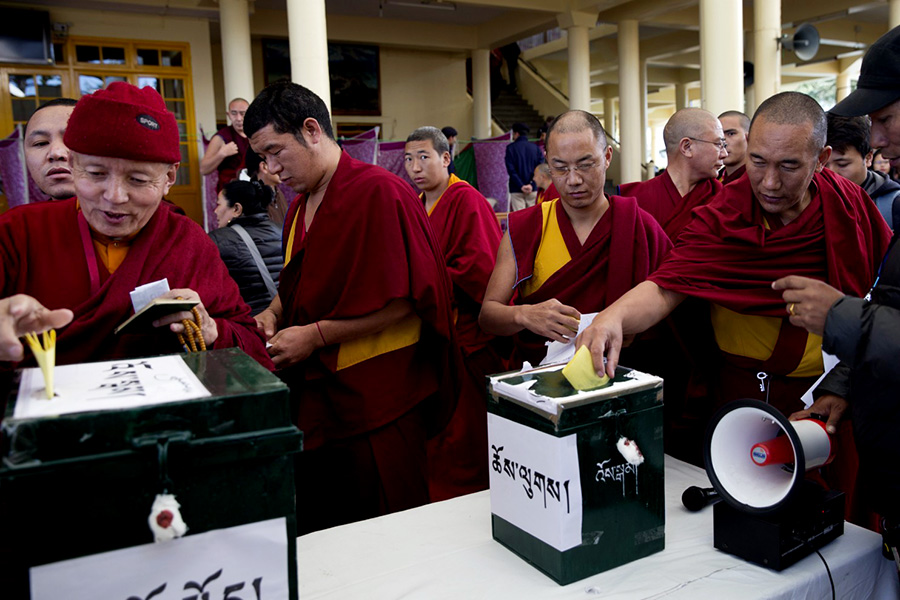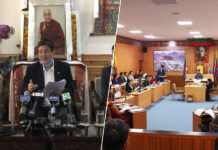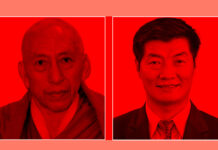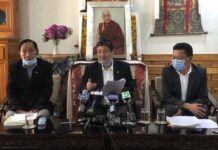
Rinchen Namgyal* argues that given the current prevalence of the Covid-19 pandemic, the upcoming exile Tibetan election need not be a choice between health and democracy and the Tibetan election authority should seriously consider introducing the option of allowing early voting for vulnerable sections of the Tibetan public.
(TibetanReview.net, Nov24’20)
On January 3, 2021, Tibetans all over the world will vote in the preliminary round of the Sikyong¹ and Chithue² election. This is a historic election. We have a record number of candidates, and for the first time ever in our nation’s history, we have a female candidate running for the highest political office.
This Tibetan election is also happening in the midst of an ongoing global pandemic caused by Covid-19. Many candidates are actively reaching out to Tibetans across various countries. The candidates are also using technology to virtually connect with their base. Despite the pandemic hardships, it is inspiring to see some candidates visiting various places to personally reach out to the Tibetan exile community scattered over many countries.
As Tibetans across the globe will go to cast their ballot on January 3rd to perform the most sacred right of any democratic system, I am concerned about the safety of voters, poll workers and election officials of getting exposed to Covid-19. As per the current Election Commission guidelines, preliminary election is scheduled to be conducted in a day. In other words, tens of thousands of Tibetans will have to cast their vote in a single day in their respective places.
I live in New York City which is home to around 10,000 Tibetans. Thus far, around 4,500 Tibetans have registered to vote for the upcoming election in New York City. Despite all the best intentions and planning by the local election officials, if thousands of people have to vote on the same day at one polling station, ensuring social distancing and safety protocols will be virtually impossible. In particular, we will be exposing the older generation, who are the primary voter base as well as the population most vulnerable to Covid-19, to a highly risky environment.
I had the privilege of voting in New York City during the 2016 Sikyong election. There was only one polling station and it was packed with people. I stood in line for more than 2 hours with my mother to vote. Around 2,600 people voted during the last Sikyong election in New York City.
How many thousands will vote this year? How will we ensure proper social distancing, given our limited financial resources and capacity?
There is a feasible solution to this health safety issue. Our election should adopt an early voting system where we can reduce the risk of Covid-19 exposure and boost people’s confidence for a safe voting event.
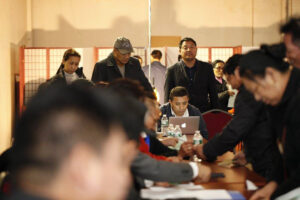
In the early voting system, voters don’t have to wait till the due date to cast their ballot. Voters have the option of casting ballots before the election day where the polling station remains open prior to the final election date. There are many countries who practice early voting. In the United States for instance, people have the option of early voting and mail in voting. This was adopted on a mass scale during the American Presidential election of November 2020. Considering the Tibetan situation, we may not be equipped for voting by mail but early voting is a solution we can and must implement to ensure the safety of everyone and maximize voter participation.
As Covid-19 cases surge throughout the world and especially in India, North America and Europe, home to more than 90% of Tibetans outside Tibet, it has become of the utmost importance to implement early voting. Early voting will not be free of short term operational difficulties but this approach is worth undertaking considering the potentially high cost of not doing so. There will be logistical challenges, and we should make every effort to maintain ballot integrity. The Election Commission cannot ask Tibetans to choose between health and democracy.
January 3rd falls on Sunday and early voting can start as early as one or two weeks before then. It could be a long weekend voting event or spread out over several weekends. By doing this, the voting event will be far safer not only for the voters, but also for local election officials and community executives as they don’t have to go through the hassle of managing hundreds or thousands of voters in a single day. Early voting will allow local Tibetan election officials the space to adhere to their local government’s Covid-19 restrictions and guidelines.
If early voting cannot be implemented everywhere, the Election Commission should at least consider implementing early voting in the places where Covid-19 cases are high and there are thousands of Tibetans in the area. Places like New York City, Toronto, the Bay Area and Minneapolis, to name a few, will greatly benefit from early voting. Every effort must be made at all levels to ensure that our voting event does not turn into a superspreader event; that is not the kind of headline that the Tibetan community needs. Early voting will ensure a safer voting event and maximum voter participation. I believe extraordinary situations call for extraordinary actions.
—
1. Sikyong – President, Central Tibetan Administration
2. Chithue – Member of Parliament, Tibetan Parliament in Exile
—
* Rinchen Namgyal is a Finance professional based in New York City. He also serves as a Board Member of Students for a Free Tibet. Rinchen is writing this article in his personal capacity.



